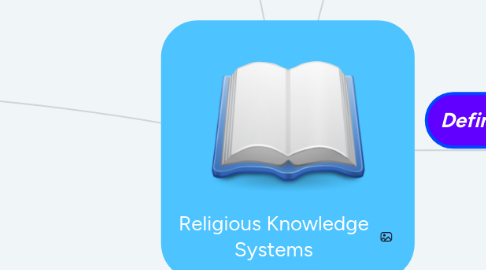
1. Methodology
1.1. Religious studies
1.1.1. Religious studies is an academic discipline focused on the study of religious behaviour, beliefs, activities and systems
1.1.2. Theology
1.1.2.1. The study of deities and religious beliefs (from the starting point that a divine being does exist)
1.2. Religious faith
1.2.1. Members of a religion are often required to believe in the doctrine and teachings of a religion without seeking justification or evidence for it
1.3. The Golden Rule
1.3.1. The Golden Rule is the principle of treating others as you want to be treated. It is a maxim that is found in many religions and cultures
2. Historical development
2.1. Rituals and rites of passage
2.1.1. Human religious activities and experiences predate written history so explorations of early religious rituals often gather their evidence from archeological findings
2.2. Religion and science
2.2.1. Historically, we can link religion to philosophy and philosophy to science
2.3. Religion and state
2.3.1. some individual states banned the teaching of evolution or required that it be taught alongside the Judeo–Christian story of creation
2.4. The history of religion
2.4.1. As with other knowledge systems, there are conceptual developments over time, both internally (inside the religious knowledge system) and externally (influences from the outside world). Religious knowledge is dynamic
3. Links to Personal Knowledge
3.1. How personal knowledge has shaped shared knowledge?
3.1.1. Religious knowledge systems appoint religious leaders to act as an authority in delivering religious teachings
3.1.1.1. Yet they do more than simply repeat religious doctrine, they shape it and present their own individual comprehension of it
4. Development of a Knowledge question
4.1. Is religion a synthetic concept derived from a human need to identify a meaningful purpose for one's existence? Or are we called upon by divine powers that will be witnessed only in the afterlife?
5. Scope and Applications
5.1. we consider religious knowledge systems to be groups that comprise people who identify themselves as belonging to a particular religion
5.2. Religious faiths and religious beliefs concerning the meaning of life, how to lives ones’ life, what happens in the after-life, and the possible existence of some superhuman governing power are spread worldwide
5.3. Major world religions
5.3.1. Buddhism, Christianity, Hinduism, Islam and Judaism
5.4. Religions often present their theories in the form of a confident and sometimes forceful statement
5.5. Metaphysical applications
5.5.1. religious testimony
5.5.1.1. The authority and testimony of religious knowledge can be passed on via religious leaders or felt on a personal level by individual followers of a religion
5.6. Moral applications
5.6.1. Morality refers to a particular system of values and principles of conduct
5.6.2. Fundamentalists and moderate believers
5.7. Social applications
5.7.1. The use of religious doctrine to successfully achieve social order
5.7.2. The use of religious authority to assume control in order to achieve personal gain
5.7.3. The use of religious festivals and feasts to create community spirit and togetherness
6. Concepts and Language
6.1. Key concepts
6.1.1. Deities
6.1.1.1. Many religions hold the belief that there exists some supreme immortal being that governs our existence
6.1.2. Salvation
6.1.2.1. Salvation as a concept refers to deliverance from sin and its consequences.
6.1.3. Faith
6.1.3.1. the complete trust or confidence in someone or something
6.1.4. Morality
6.1.4.1. Morality plays an important role in religious knowledge systems and religious authorities (very often representing the teachings of a deity or deities) present a creed which outlines how followers of the religion are expected to behave
6.1.5. Agnosticism
6.1.5.1. Doubting the existence of deities
6.1.6. Atheism
6.1.6.1. The rejection or lack of belief in the existence of deities
6.2. Vocabulary
6.2.1. Metaphysical
6.2.1.1. means relating to metaphysics; metaphysics is a branch of philosophy that explores the nature of being, existence and reality
6.2.2. Testimony
6.2.2.1. evidence or proof of something, sometimes in the form of a formal written or spoken statement
6.2.3. Mythology
6.2.3.1. A collection of stories belonging to a particular religion or cultural tradition
6.2.4. Doctrine
6.2.4.1. A set of beliefs held and promoted by a Church, political party or other group
6.2.5. Rites of passage
6.2.5.1. Rituals and ceremonies that mark key transitional events in a person’s life such as birth, reaching adulthood, marriage and death
6.3. Language
6.3.1. Doctrine
6.3.1.1. Most religious knowledge systems have developed (and refer to) written ideology or a creed.
6.3.1.2. sacred text
6.3.1.2.1. Translation can lead to multiple literary and linguistic interpretations of the text
7. Presentation of one Real Life Situation (RLS) connected to the AOK
7.1. The Galileo affair
7.1.1. This theory, originally proposed by Copernicus, states that the Sun, not the Earth, is at the centre of the universe
7.1.1.1. Galileo’s findings challenged those views held by the Church at that time and this did not end well for him
